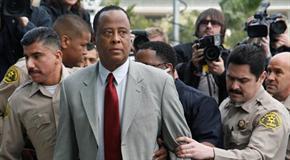Features
Jury Selected In Jackson Doctor’s Case
The jury of seven men and five women chosen for the involuntary manslaughter trial of Dr. Conrad Murray includes people who considered themselves fans of the King of Pop and others who had lost interest in his music.

Their occupations include mail carrier, college professor, paralegal and school bus driver.
A 54-year-old woman who works in management wrote on her jury questionnaire: “Loved his music as a young girl, as an adult not so much but saw his talent in music and dance.”
The only African-American juror, a 54-year-old man, said, “When I was a kid I liked the Jackson Five. Things change as you get older. I’m more of a Jay-Z fan.”
Murray was charged with involuntary manslaughter in February 2010. Since then, both sides have jockeyed to frame the case in their favor.
Prosecutors contend Murray was negligent in administering to Jackson a lethal dose of the anesthetic propofol and other sedatives in the bedroom of the singer’s rented mansion without access to proper life-saving equipment.
Murray’s attorneys have floated theories that the 50-year-old singer may have given himself the fatal dosage in June 2009 and say the Houston-based cardiologist did not give the singer anything that should have killed him.
Opening statements were scheduled Tuesday in the case.
The jury was selected after less than six hours of questioning by a judge, defense attorneys and prosecutors.
The speed with which the panel was seated is likely a result of the exhaustive 30-page questionnaire the group filled out earlier this month when jury selection began.
Deputy District Attorney David Walgren joked with prospective jurors that the process seemed like “the courtroom version of speed dating, trying to get the most information in a short time.”
Superior Court Judge Michael Pastor, determined to move the process quickly, gave each side only 20 minutes to question the first 27 prospects.
Six alternates were sworn in later in the day, but an immediate glitch developed when one of them reported a problem to the judge. A transcript of the discussion was sealed.
The woman was immediately dismissed from the panel, leaving five alternates for the balance of the trial.
Murray has pleaded not guilty and could face four years in prison and loss of his medical license if convicted.
As might be expected, the personality and life of the late singer dominated much of the jury questioning.
“Part of this trial is going to be about Michael Jackson,” said defense attorney Ed Chernoff. “We’re not going to drag up stuff that happened that people may not want to hear about.”
But he immediately asked panelists how they remembered Jackson.
One woman said, “as a child with the Jackson Five.”
He then asked if she felt that Jackson was childlike in adulthood. She answered no. He asked the entire panel if they saw Jackson as so childlike that he might not be able to make responsible decisions.
“Does anybody here believe Michael Jackson was less capable of making decisions than anybody else?” Chernoff said.
Jurors shook their heads no.
“Does anybody feel Michael Jackson should be held to a different standard of responsibility?” the lawyer asked.
Again, jurors indicated negatively.
During his questioning, prosecutor Walgren framed the issue differently. He wanted to know if a “victim” in a hypothetical car accident could be held partially responsible for his own death if he walked in front of a driver who was running red lights and driving recklessly.
The defense objected to the term “victim,” and Walgren changed it to “alleged victim.”
He was probing whether panelists might hold Jackson partially responsible for his own demise and thus absolve Murray of responsibility. None said they would.
Bailiffs marched 84 potential jurors into the courtroom, but 10 were quickly dismissed because they said they could no longer serve on such a long case.